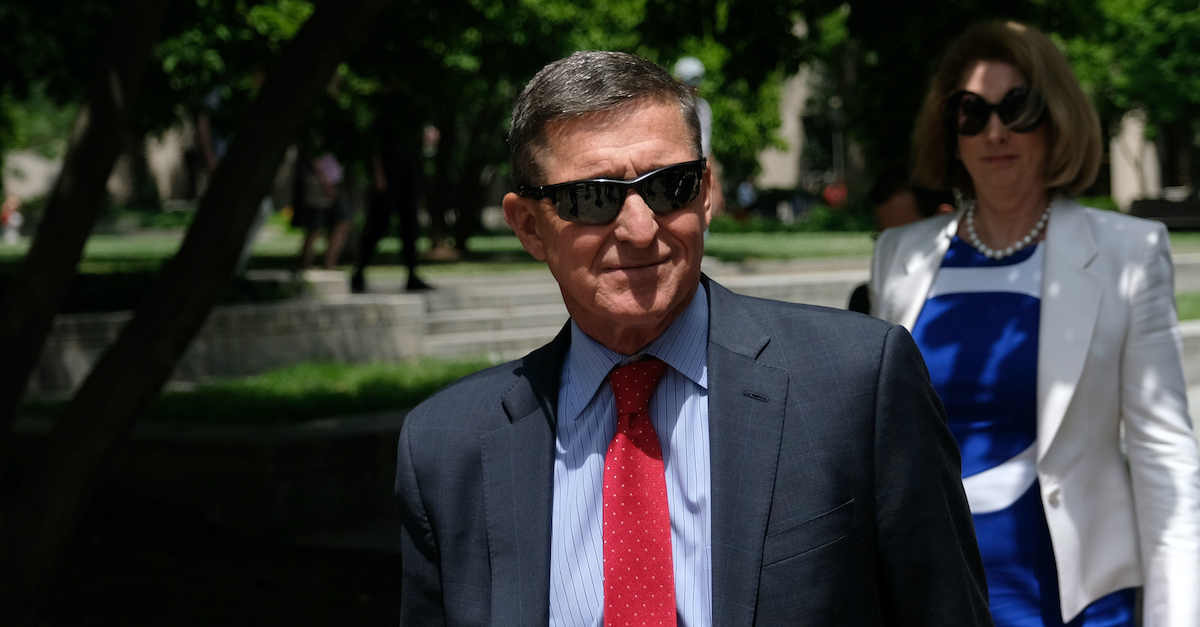
A federal court on Tuesday scheduled a long-awaited hearing to determine the fate of onetime National Security Advisor and retired Lt. Gen. Michael Flynn. U.S. District Judge Emmet G. Sullivan issued a series of deadlines in a minute order on the District of Columbia docket that seeks to finally dispense with the high-profile case.
The court’s order grants a “joint motion to expedite” filed by both sides in the matter and also calls for a “status report as to” Flynn–a summary of the legal situation up to the present state of affairs.
“The court-appointed amicus curiae shall file his reply brief no later than 12:00 PM on September 11, 2020,” the order provides.
That amicus curiae, retired judge and former prosecutor John Gleeson, has held an atypical source of power–by way of an otherwise fairly standard status–in Flynn’s case since May when he was appointed by Sullivan to argue against the government’s motion to dismiss the charges against Flynn.
Typically, an amicus curiae petitions a court and files supporting documents that argue for and/or against one or both sides in a legal proceeding. Traditional examples would include civil liberties organizations or environmental groups intervening in a case to discuss public policy issues implicated in any given legal controversy.
Critics see Gleeson’s status and power as a product of Sullivan’s own, years-old, reticence to treat Flynn with a light touch.
During his first sentencing hearing in December 2018, the Bill Clinton-appointed judge exhibited arguable bias against Flynn by upbraiding him during a scuppered sentencing hearing by opining that the defendant “sold [his] country out.”
Sullivan also controversially asked the prosecution whether Flynn could have been charged with treason. The second question was unanimously viewed as legally off-base and inappropriate because of the very limited legal definition of “treason.”
For months, Flynn and his attorneys have been engaged in a back-and-forth with Judge Sullivan and the D.C. Court of Appeals over the government’s efforts to dismiss the years-old prosecution on charges of lying to federal investigators during the Robert Mueller-led Russiagate investigation. Flynn twice pleaded guilty to those charges but Sullivan was originally askance of the light sentencing request proffered by the government. When Attorney General Bill Barr followed the recommendation of U.S. Attorney Jeffrey Jensen and moved to dismiss Flynn’s charges with prejudice, the judge flatly declined to rule on the motion.
After that, Flynn and his defense team cried foul and sought to bypass Sullivan entirely. Flynn’s lawyers sought the form of extraordinary relief contained via the common law writ of mandamus in an effort to force the lower court to accept the government’s motion to dismiss. That didn’t work and now the ball is back in Sullivan’s court for, seemingly, one last quarter at least.
The legal drama is scheduled to (maybe) begin to end during a hearing on September 29–where the court will hear oral arguments over the latest version of the motion to dismiss, the government’s response to Gleeson’s latest argument, and Gleeson’s reply brief. That hearing is slated for 11:00 AM and will be held via teleconference.
[image via Alex Wroblewski/Getty Images]